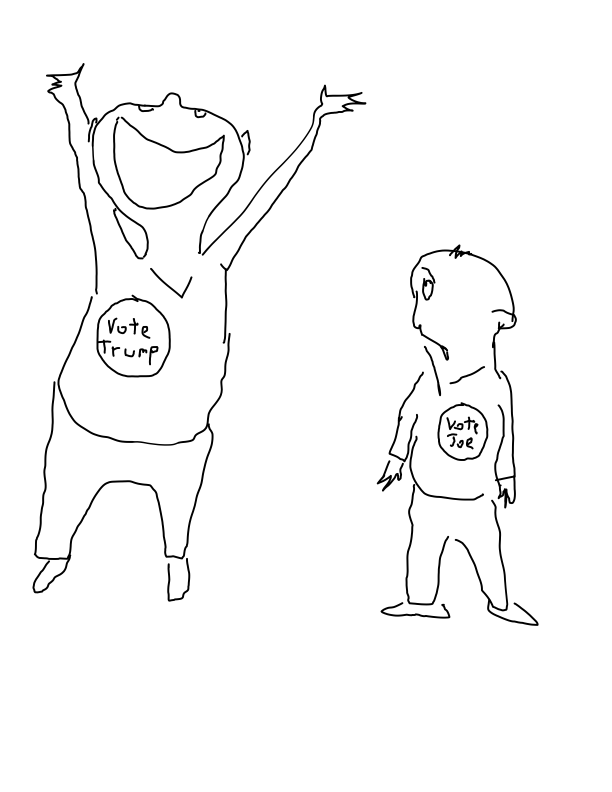So, Billy-Boy, another Supreme Court vacancy. One more pawn on the court for our side means there is nothing they can do to stop us now. Nothing.

Right, boss. Consider yourself king!
Month: September 2020
Fascist Police State
Where we now live–a very large apartment building next to the National Zoo in Washington–there is a story night which occurs via Zoom every so often.I volunteered and told one of my favorite stories, which if you know me, you may have heard before. I thought it might be worth hearing again.
This story takes place in 1967 in New York City where I was a graduate student at Union Theological Seminary. Embry was a senior at Barnard College. We had been married about a year.
Now the country in 1967 was going through some challenging times—similar in some respects to the times we are in today. The Civil Rights Movement had split into many groups some of which, like the Black Panthers, were advocating violence. Cities were burning from violent protests— Los Angles, Newark and Detroit had all experienced what was called by some civil disturbances and by others race riots. The Vietnam War was heating up, and all young men had to sign up for the draft. At Union, many of my fellow students were burning their draft cards, not to avoid the draft but to protest the war and the fact that it was being fought mainly by the working class and African Americans. Anti war protests were happening all over the country and far left groups like the Weathermen were talking about overthrowing the government. Police brutality was an issue then as it is now though the issue of brutality against African Americans did not gain the attention that it has now. And it was just the beginning of the long hair fad for men and the hippie movement.
It was a heady time.
This is the environment that Embry and I found ourselves in when this story took place.
We lived off campus in an old, five-story apartment house, showing its age. Though it had a Riverside Drive address, it was only about a block from 125th Street in a neighborhood very near Harlem that at the time could be called seedy. Almost everyone we knew had been robbed at least once, and being robbed was a usual topic at get-togethers and cocktail parties. In fact we were robbed ourselves when someone broke into our apartment from the fire escape in the middle of the day and cleaned us out. When I called the insurance company to report the devastating loss, the representative was very sympathetic and agreed to send out an insurance adjuster right away.
“And how much do you think you will be claiming in losses?” he asked.
“Oh, it is awful, just terrible. We have lost just about everything.”
“So how much money do you think it all amounts to?”
“I would guess about $500.”
“That’s it?”
“Well, yeah.”
“Forget the adjuster. I will write you a personal check and send it out this afternoon.”
We lived in a rent-controlled, studio apartment probably around 400 square feet with two windows opening up to an airshaft. The only way to know what the weather was like was to call the weather lady. Our rent was $75/month including utilities.
And we loved that apartment.
The story begins around 5:00 PM when I thought I smelled smoke and walked out into the hallway where, sure enough, there was smoke coming out of the trash chute. About the same time our next door neighbor, Don, opened his door and came out to figure out what was happening. Don was a 20-something, skinny guy who only wore tee shirts and jeans and had really long, curly blond hair. He was a prototypical early hippie. He had invited me into his apartment once, and the only furniture he had was a mattress on the floor next to an amplifier, loud speaker and a guitar. We knew he had a guitar because his favorite time to play—and which we could hear—was between two and three in the morning. Almost every morning.
“So,” I turned to Don. “Do you think the building is burning down? Maybe we should call the super.”
“I don’t know,” he said, “but I am sure not going to call Poitras. The guy hates me. If it turns out to be a false alarm, I know he will throw me out.”
Joe Poitras was the super for the building. He was probably around 50, bald, and had a huge pot belly and always had a two- or three-day beard and could not get out a sentence with fewer than a half dozen profanities. He wore grease-stained undershirts and dirty work pants. Most people we knew in the building were terrified of the man—both because he was known for chewing people out if they ever asked for help or filed a work order and also because almost every night you could hear him and his wife having violent arguments, shouting at each other from their basement apartment. We could hear them all the way up on the 5th floor. The arguments would usually end with bangs that we figured were from pots thrown at each other.
“You are right,” I said, “We better not call Poitras. The smoke seems to be diminishing anyway.”
Don then shrugged his shoulders and in a matter-of-fact way, said, “You know, we live in a goddamned, fascist police state.”
“Pardon?”
“What I said was that we live in a goddamned, fascist police state.”
“Really?”
“Yeah, take last night for example. I was not bothering anyone, just playing my guitar, and at three AM, I hear these loud knocks on my door and these three cops come bursting in and go straight to my bathroom. Then they start flushing the toilet over and over and then come over to me. I know the routine. Up against the wall motherfucker. So when I see them coming at me I go up against the wall, spread eagle, arms out wide. They didn’t have to search me because all I had on was my jockey shorts. But I knew they were going to hit me. I know what cops are like.
But no, they didn’t hit me. They just looked at me. Then one of them said, ‘Ok, you goddamn hippie, you try this trick again and we are hauling you in.’ Then they slammed the door and left.”
“Oh my goodness.”
“Yeah, this is deliberate intimidation. And it is psychological warfare. I am not sure I am going to be able to sleep. And it’s just because of my long hair, and they think I am a hippie. I tell you it is fascism. We live in a goddamned, fascist police state.”
While Don and I were having our conversation, Embry was in the basement doing the laundry. When the smoke petered out, Don went into his apartment. When Embry returned, I immediately told her the story. “I am telling you,” I said, “we live in a goddamned, fascist police state. What else could explain this intimidation and just because the guy has long hair!”
Embry immediately burst out laughing.
“What is so funny about that?”
“Well,” she said, “let me tell you my story. When you were talking with Don, I was talking with Mrs. Finkelstein in the laundry room.
Mrs. Finkelstein was a shy, tiny woman in her mid 80s, who used a cane and had lived in her two-bedroom, rent controlled apartment for as long as anyone could remember. Her husband had died several years ago, and she rarely left her apartment—mainly to go to the grocery store or drug store. Her apartment was directly across the hall from Don’s apartment.
“Well, I heard the saddest story from Mrs. Finkelstein in the laundry room. She told me about this awful experience she had last night. In the middle of the night her toilet started running. She was afraid to call Joe Poitras because the last time she called him and woke him up he screamed at her. So she called the police instead. But you know what? This time the police never came. She had to stay up all night flushing the toilet until mid morning when she could safely call Joe Poitras.”
“You know,” she told me, “the police just don’t care anymore. They used to, but nowadays they won’t help an old lady like me. What has the world come to?”
We never got to tell this story to either person. Don mysteriously left the building permanently the next week leaving behind his only possession other than his guitar—a mattress on the floor. And Mrs. Finkelstein never ventured out of her apartment again at the same time we did. We tried knocking a time or two, but she never answered, probably fearful it might be the police or worse, Joe Poitras.
And so it is possible to have a valid opinion about a bleak world where fascist police break into your apartment in the wee hours of the morning to intimidate you, where hippies and other counter culture types harass police, and a world which is uncaring and where police do not respond to emergencies. But thankfully, not always is the world what it appears to be. It all could boil down to getting one digit of an apartment number wrong.
The Solemn Pledge of the Attorney General of the United States of America
I solemnly swear to uphold the Constitution of the United States of America and to defend the President of the United States….

From being convicted of rape, sexual assault, perjury, graft, corruption, theft, money laundering, collaborating with an adversary of the United States and related crimes and misdemeanors.
The Great American Divide
So how do you feel now about voting for Trump after hearing about the damaging Atlantic Magazine article saying how Trump devalues the military and the Michael Cohen book last week which says Trump is a liar and a cheat and the Woodward book this week which proves (along with the audio tapes) that Trump knew all along that Covid-19 was a killer and lied to the American people about it?
I have no idea what you are talking about. I have not heard a word about this on Fox News, and even if I had, I would not believe it. Trump is the greatest president we have ever had. What he said was just trying to keep America from panicking. He is our hero and our only hope for fighting the Satanic deep state.
The Atlantic Magazine Revelations
NO! NO! NO! I never called soldiers who died in the line of duty defending our country a bunch of “losers and suckers.”

I called them a bunch of wimps and wussies!
Vaccine To Be Ready Days Before The Election
Hey, great news! Trump says he will have a vaccine for us on November 1.

Yeah, but I hear it will only be available for those who can prove they voted for him.
“Let’s Kill All The Lawyers.” Shakespeare’s Henry VI, Part 2
Reader take note: This is pretty close to what happened to your Faux News editor and extended family yesterday.
Yes, Mr. and Mrs. Jones, it is true that you have paid my fee of $600 for one hour of consultation to answer your ridiculously easy legal question. But I am not going to answer it unless you pay my retainer fee of $15,000 and an ongoing monthly retainer fee of $1,800 until the legal issue is fully resolved. Furthermore, do not try to answer this yourself by going to the internet. You could step on a landmine and end up in jail yourself.

What do you mean, why not answer it if it is easy? Magic tricks are easy once you know how they are done, but do you expect a magician to reveal his magic? Of course not. That is the way it is with lawyers, so get over it.